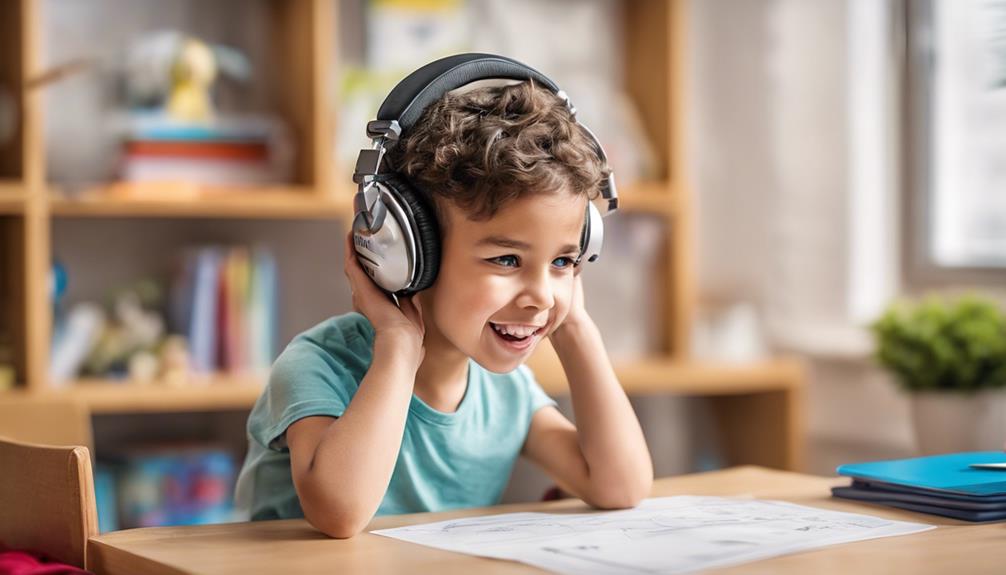In the intricate symphony of sound processing, Auditory Processing Disorder (APD) therapy acts as a conductor guiding individuals towards improved processing skills. With a blend of specialized techniques and tailored interventions, this form of therapy offers a pathway to enhancing auditory abilities.
From refining sound recognition to sharpening memory recall, APD therapy holds the key to unlocking potential in those grappling with processing challenges. Join us as we explore the transformative journey of how APD therapy can orchestrate a harmonious tune of progress for individuals seeking to fine-tune their auditory processing skills.
Key Takeaways
- APD therapy offers personalized strategies to enhance auditory processing skills.
- Therapy builds compensatory strategies for active listening and problem-solving.
- Improves confidence, resilience, reading, and language processing in individuals with APD.
- Tailored approaches cater to the severity of the disorder for effective improvement.

Flaygo Pro Rechargeable Hearing Aids for Seniors with Hearing Loss, Smart Noise Reduction Chip for Crystal-Clear Sound, Ultra-Comfort Fit, Super-Mini & Auto On/Off
Restore Authentic Human Voices: Equipped with the Flaygo self-developed the newest digital chip, these hearing aids utilize adaptive...
As an affiliate, we earn on qualifying purchases.
Understanding Auditory Processing Disorder (APD)
In diagnosing Auditory Processing Disorder (APD), audiologists play a crucial role in assessing the brain's ability to accurately comprehend sounds, a condition not linked to hearing loss. APD, also known as Central Auditory Processing Disorder (CAPD), can impact both children and adults, often presenting symptoms that overlap with other disorders such as ADHD or Autism Spectrum Disorder. This disorder can make everyday tasks challenging, like following directions, understanding speech in noisy environments, or grasping abstract concepts.
When individuals struggle with auditory processing, it isn't a matter of a physical hearing impediment but rather how the brain interprets and processes sounds. This distinction is vital in recognizing and addressing APD effectively. By understanding the nuances of diagnosing auditory processing disorder, audiologists can provide the necessary support and guidance for individuals experiencing these difficulties. Through accurate assessments and tailored interventions, those with APD can work towards improving their processing skills and enhancing their overall quality of life.

CUEME Hearing Aids - OTC Rechargeable Hearing Aids for Seniors, Clear Sound, Up to 48 Hours of Battery Life, 3 Sizes of Earbuds, Portable Charging Case Included, Automatic On/Off
【New Generation Noise Reduction Chip】The new generation chip can effectively filter out 90% of background noise, while accurately...
As an affiliate, we earn on qualifying purchases.
Benefits of APD Therapy

Benefitting individuals with Auditory Processing Disorder (APD), therapy offers targeted interventions and personalized strategies to enhance auditory processing skills. Through APD therapy, individuals can develop compensatory strategies that improve active listening and problem-solving abilities. By focusing on strengths and weaknesses, therapy aims to boost confidence and resilience in children dealing with APD. Utilizing multi-sensory learning techniques, therapy helps in areas such as reading and language processing, enhancing overall auditory processing skills.
Moreover, the intensity of therapy matches the type and severity of the disorder, with a range of methods available, from computer-assisted programs to personalized one-on-one training. These tailored approaches ensure that individuals receive the support they need to address their specific challenges effectively. Ultimately, APD therapy equips individuals with the tools and skills necessary to navigate the demands of daily life with increased confidence and success in processing auditory information.

Audien Hearing ATOM PRO 2 Wireless Rechargeable OTC Hearing Aids, Premium Comfort Design and Nearly Invisible
Hear What Matters, Forget the Rest: Tired of asking, “What?” in conversations? The Atom Pro 2 is here...
As an affiliate, we earn on qualifying purchases.
Types of APD Therapy Approaches
When it comes to addressing Auditory Processing Disorder (APD), we understand the importance of exploring various therapy approaches.
We'll discuss an overview of these approaches, the utilization of multisensory techniques, and the development of individualized treatment plans.
Therapy Approaches Overview
Exploring various therapy approaches for Auditory Processing Disorder (APD) can significantly enhance individuals' processing skills and overall quality of life. When considering therapy for APD, it's essential to understand the different approaches available:
- Speech-Language Therapy: This approach focuses on improving sound distinction, memory, and sequencing skills, crucial for individuals struggling with APD.
- Educational Therapy: Children with APD benefit from strategies to manage frustration, capitalize on strengths, and enhance multi-sensory learning experiences.
- Auditory Training: Techniques like sound discrimination training, auditory memory exercises, and language-processing strategies are used to boost processing skills.
- Tailored Intensity: Therapy intensity and methods are customized to match the type and severity of APD, ensuring effective improvement in processing skills.
Multisensory Techniques Used
How can multisensory techniques revolutionize auditory processing disorder (APD) therapy approaches?
Multisensory techniques play a crucial role in addressing auditory processing difficulties by engaging various senses simultaneously. By incorporating visual, tactile, and movement-based activities, these approaches offer alternative pathways for individuals with APD to process and retain information effectively.
Through a combination of sensory inputs, such as visual aids, auditory cues, and kinesthetic experiences, individuals can enhance memory, attention, and comprehension skills. Moreover, multisensory strategies aim to strengthen neural connections, promoting the integration of auditory information with other sensory modalities.
This comprehensive approach supports the development of efficient processing strategies, empowering individuals with APD to overcome challenges in auditory tasks and improve overall processing abilities.
Individualized Treatment Plans
To tailor effective treatment plans for individuals with Auditory Processing Disorder (APD), a combination of speech-language therapy, educational therapy, and auditory training is often utilized to address specific processing challenges and enhance overall auditory skills.
- Customized Approaches: Individualized treatment plans are crafted to meet the unique needs of each person with APD.
- Speech-Language Therapy: This therapy focuses on improving sound distinction, memory, and sequencing abilities crucial for processing improvement.
- Educational Therapy: Strategies are developed to build on strengths, manage frustration, and use multi-sensory techniques, especially beneficial for children with APD.
- Auditory Training: Methods such as sound discrimination training, auditory memory exercises, and language-processing strategies are employed to target and enhance processing skills.
These combined therapies aim to provide comprehensive support for individuals with APD, helping them navigate and thrive in their auditory processing journey.

ELEHEAR-Beyond Pro Hearing Aids, Bluetooth OTC Hearing Aids for Seniors and Adults, Premium Sound Algorithm with VocClear 2.0, 30% Clearer Speech, Music Mode & Enhanced App, Bluetooth Streaming
Ultra-clear, Natural Sound - Powered by VocClear 2.0 technology that delivers 30% clearer speech, ELEHEAR-Beyond Pro hearing aids...
As an affiliate, we earn on qualifying purchases.
Techniques for Improving Processing Skills

Let's explore some key techniques for enhancing processing skills in auditory processing disorder therapy.
Effective listening strategies, memory retention techniques, and communication improvement exercises are pivotal in improving sound processing abilities.
Effective Listening Strategies
When supporting individuals with auditory processing disorder, effective listening strategies can enhance their processing skills.
- Utilize visual cues: Incorporating visual aids can assist in reinforcing auditory information for individuals with APD.
- Emphasize key words: Highlighting important words in sentences can help individuals focus on essential information.
- Active listening techniques: Encouraging active participation, like repeating instructions, aids in information retention.
- Create a structured environment: Providing a quiet and organized setting supports better focus and understanding during listening tasks.
Memory Retention Techniques
Enhancing memory retention techniques is pivotal in improving processing skills for individuals with auditory processing disorder (APD).
Techniques such as using mnemonic devices, breaking down information into smaller chunks, and repetition can help enhance auditory memory. Mnemonic devices, like acronyms or rhymes, aid in recalling information by creating associations.
Visualization and rehearsal are valuable strategies for strengthening auditory memory. Engaging in activities that challenge auditory memory, such as memory games or active listening exercises, can significantly boost processing abilities.
Consistent practice of these memory retention techniques under the guidance of a therapist is essential for individuals with APD to improve their auditory processing skills effectively. By incorporating these strategies into daily routines, individuals with APD can enhance their ability to store and retrieve auditory information.
Communication Improvement Exercises
Communication improvement exercises for individuals with Auditory Processing Disorder (APD) focus on enhancing auditory processing skills through targeted sound discrimination tasks and auditory memory exercises. These exercises aim to strengthen weak auditory processing areas, leading to improved communication and learning outcomes for individuals with APD.
Here are essential techniques used in communication improvement exercises:
- Sound Discrimination Tasks: Engage in activities that require distinguishing between similar sounds to sharpen auditory discrimination skills.
- Auditory Memory Exercises: Practice remembering and recalling verbal information to enhance auditory memory capabilities.
- Sequential Processing Strategies: Implement strategies to help organize and comprehend auditory information in a sequential manner.
- Language-Processing Techniques: Utilize techniques to improve language skills and processing abilities for effective communication.
Role of Speech-Language Therapy

Speech-language therapy plays a crucial role in equipping children with auditory processing disorder with the necessary skills to improve their sound processing abilities. Through targeted exercises focusing on sound distinction, memory, and sequencing, speech-language therapy aids in developing essential auditory processing abilities.
By honing these skills, children with APD can enhance their overall communication skills and comprehension. The structured approach of speech-language therapy is designed to address specific weaknesses in auditory processing, providing children with systematic support in managing auditory challenges effectively.
Early intervention with speech-language therapy not only helps in building confidence and resilience but also equips children with APD with effective communication strategies that can benefit them in various aspects of life. Therefore, speech-language therapy serves as a vital tool in empowering children with APD to navigate and overcome the obstacles they face in processing auditory information.
Implementing APD Therapy at Home

To enhance your child's auditory processing skills at home, creating a quiet and structured environment is essential. Here are some tips to help you implement APD therapy effectively:
- Minimize Auditory Distractions: Reduce background noise during therapy sessions to help your child focus on the tasks at hand.
- Practice Sound Discrimination Exercises: Engage your child in activities that require distinguishing between different sounds to improve their auditory processing abilities.
- Include Auditory Memory Tasks: Incorporate memory games and exercises that challenge your child to remember and recall auditory information.
- Utilize Visual Aids and Clear Communication: Support therapy sessions with visual aids, repeat instructions when necessary, and ensure your communication is clear and concise to aid understanding.
Frequently Asked Questions
How Can I Improve My Auditory Processing Skills?
We can enhance auditory processing skills through engaging in exercises, practicing active listening techniques, using visual aids, seeking guidance from professionals, and utilizing assistive devices.
It's essential to be proactive in improving listening abilities by incorporating various strategies into daily routines.
How Can You Help Someone With Auditory Processing Disorder?
We can support individuals with auditory processing disorder by providing visual cues, using repetition, and creating a quiet environment. Active listening and extra processing time can also be beneficial.
Utilizing technology like speech-to-text software can aid in comprehension. These strategies help enhance communication and understanding for those facing auditory processing challenges.
What Are Coping Strategies for Apd?
When dealing with APD, coping strategies are crucial. Visual aids, concise instructions, repetition, summarization, and breaking tasks into steps are all helpful.
Additionally, ensuring a quiet, structured environment can boost focus and comprehension. These strategies can make a significant difference in daily life for individuals with APD.
What Are the Teaching Strategies for Auditory Processing Disorder?
Teaching strategies for auditory processing disorder involve emphasizing key words and using visual cues for better understanding. Preferred seating and quiet environments are beneficial too.
Sequencing and breaking down complex instructions into smaller steps can improve processing skills. Multi-sensory techniques aid comprehension.
Technology like teacher microphones and noise-cancelling headphones enhance learning environments. These strategies cater to different needs and foster a more inclusive educational experience for those with auditory processing disorder.
Conclusion
In conclusion, APD therapy offers significant benefits in improving processing skills for individuals with auditory processing disorder.
Did you know that approximately 5-7% of school-aged children have APD?
By utilizing targeted therapy approaches, such as speech-language therapy and educational therapy, individuals can enhance their auditory processing abilities, leading to better learning and communication outcomes.
It's important to seek professional help and implement therapy techniques at home to support individuals in managing frustration and building on their strengths.










